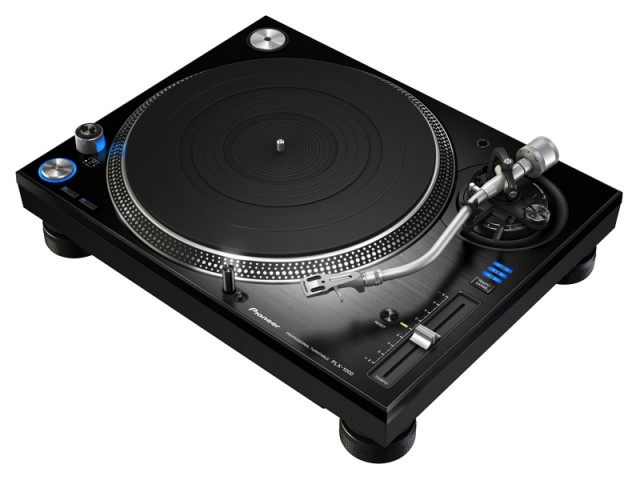Back at Musikmesse, it really looked as though Pioneer had simply cloned the legendary Technics 1200 turntable and re-badged it Pioneer.
But… that seems sort of obvious, right? Maybe there’s some sort of digital interface. Or extra I/O. Or some feature we hadn’t thought of. Maybe there’s a connection to digital vinyl control systems. Maybe it integrates with a new line of Pioneer hardware. Maybe they’ve invented a new platter mechanism. Maybe it was all an enormous distraction, and then they were unveil some new DJ touchscreen or line of running shoes or Minority Report interface for big clubs. Maybe they were starting a boutique vinyl record label. Maybe it’s a clothing line. Maybe inside the turntable is some new hardware. Maybe inside the turntable is another turntable. Maybe it will support Keurig K-Cup coffee pods, and you’ll be able to enjoy delicious brewed coffee for those 8-hour Sunday DJ gigs.
Okay, actually, spoiler alert – it is really just a 1200 clone with a Pioneer logo on it.
But it’s supposed to be … really good. And that’s good. I think.
It’s called the PLX-1000. List price US$699.
It has “a user friendly layout familiar to top DJs of the past and present.” Yeah, it looks like a Technics 1200 with a Pioneer logo on it. If you’ve never seen a Technics, they go on to explain that means it has “a quick tempo control capability on the right side of the player, start/stop button on the left side, and a high-torque platter with a lighted speed guide.”
It has a “high-torque direct drive system,” like a Technics 1200.
It is “Designed for optimal sound quality.” Um… good!
It has “Detachable power and audio cables.” Even better. The actual news there, though, is that the connections are just phono/cinch cables and electricity – nothing digital here. That’s frankly to me not so surprising – lovers of the 1200s probably just want a new 1200 from Pioneer, and would view any new-fangled addition as blasphemous. On the other hand, what makes this decision predictable and perhaps logical also makes it fairly boring. (In Pioneer’s defence, bad decisions would have entertained me more, but then they would have had to make a bad decision, so I’m not really faulting them so much as hunting around in the dark for something to write about.)
Okay, let me try harder.

Detachable cabling means you can customize your sound. Photo and customization idea courtesy Pioneer.
The integration with Pioneer hardware goes like this: “Combine the PLX-1000 with a Pioneer professional series DJM mixer for an ideal system for true vinyl enthusiasts.”
Well, yes, you can in fact combine audio equipment with mixers. Perhaps two turntables and a DJ mixer. (Music enthusiasts might also want to combine two PLX-1000s with a handheld vocal-ready professional transducer – you know, two turntables and a microphone. Where it’s at, I’ve heard.)
And in fairness, it’s made from things. Some of these things are made in a way that makes them more better, as opposed to less better. These things won’t, say Pioneer, fall apart, or actively destroy your sound. They won’t melt at room temperature.
We can get specific. The die-cast zinc is “heavy mass.” (Sorry, my Physics just broke on that.) The resin is 8 mm thick – a godsend for those who recently have been frustrated with sum-8 mm resins in their record players.
Actually, let’s hone in more on those detachable cables. Yes, I’ll agree, hardware with built-in cables is annoying. But this affords still more conveniences I frankly hadn’t considered. For instance: “Users are also able to interchange cables to further customize the sound quality.”
Not just improve: customize. You could try all kinds of cables to really get your own special sound. (Don’t touch that resin, though.)
I’m done.
Queue the obligatory artist video with vague revelations about sound quality.
Anyway, maybe it is quite good. There are other 1200 clones. I have no idea how they compare; that’s a slightly interesting question.
But it means Pioneer can sell turntables to clubs alongside those mixers and CDJs. And I don’t doubt for a second that that’s a smart move. Because, as it happens, Pioneer’s job isn’t to entertain me. But my job is to entertain you. So if there is something we can learn about these, or if you’d really prefer I be quiet and we get back to digital tech – well, let us know.
http://www.pioneerelectronics.com/PUSA/DJ/Turntable/PLX-1000
As for vinyl, don’t call it a comeback?
Nope. It’s definitely a comeback, for better or for worse.
